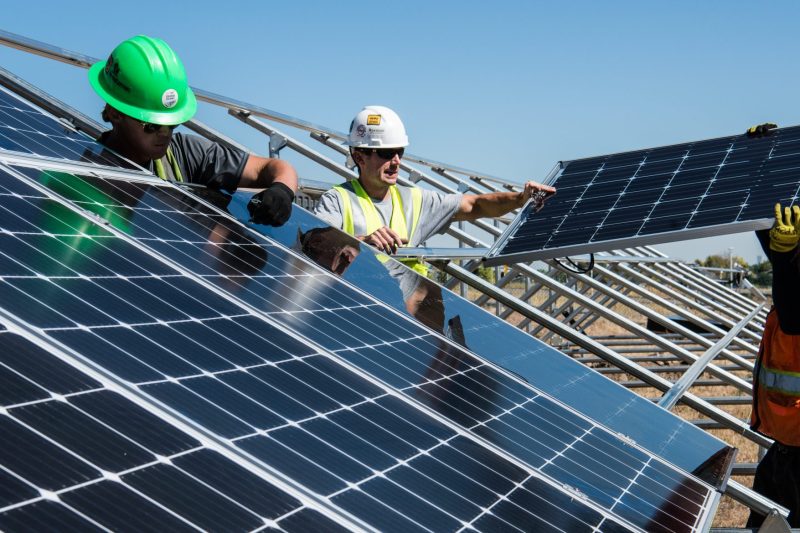If you’ve ever had an extension built or any other major work done to the exterior of your home or garden, you might have encountered the sometimes tricky world of local planning rules and regulations. These are the building laws put in place by the local authority to make sure no new development spoils the look and feel of a particular area, or causes undue disruption to anyone else’s property (like blocking out light by replacing a garage with a towering extension). And if you’ve experienced this before and are currently thinking about making the switch to green energy and having solar power installed, you’re bound to be asking yourself: ‘do you need planning permission for solar panels?’ The good news is that in the vast majority of instances, solar panels do not require planning permission, as they are classed as what is known as ‘permitted developments’. The government-backed Planning Portal site says “The installation of solar panels and equipment on residential buildings and land may be ‘permitted development’ with no need to apply to the Local Planning Authority for planning permission.” What is a permitted development? Permitted developments are basically less significant changes or additions to properties that are approved by default as long as they don’t break any other rules relevant to the local area. The installation of solar panels is classed as a permitted development, thanks partly to their relative unobtrusiveness, but also to the government’s desire to encourage more homeowners to install solar panels on their property. Reducing the regulatory barriers acts as an incentive and has seen countless more households across the country adopt the amazing, cost-saving benefits of solar. So if you’ve been wondering, now you know – you may not need to speak to the council half as much as you thought! Do you need planning permission for solar panels? As we’ve found out, not in the vast majority of instances. But there are some cases in which the installation of solar panels might fall outside the realm of permitted developments. This is when:
- Your house is a listed building
- It is situated in a conservation area subject to specific local rules
In both of these examples, it is still possible to apply for – and be granted – planning permission for solar panels, but this decision will be at the discretion of your local authority rather than being approved by default. If the council thinks that your solar panels are likely to have too much of an impact on your property or on those around it, they may say no. There are other criteria that can stop a solar panel installation from falling within the class of a permitted development. To avoid the need for planning permission and the risk of having solar panels removed after installation, they must:
- Not be installed about the highest point on your roof, excluding chimneys
- Not stick out by a distance of more than 200mm from the roof edge
- Not adversely affect the external look of your property or the surrounding area
On this last point, the regulations are a bit vague. Perhaps this is another intentional facet of the government’s plan to encourage more people to adopt solar, giving enough leeway so that in the majority of cases the installation of solar panels does not need planning permission. As long as you’re not completely destroying the architectural or aesthetic value of your home or its surrounding area, you’ll be fine. Thankfully, solar installations done by a reputable company like Project Solar UK are designed to be in keeping with the look and feel of your home and its surroundings, as well as set up to maximise energy production and output. Are there any other rules to be aware of? There are a couple of other key things to be aware of. Firstly, there is a rule in place that says that solar panels need to be taken down from your roof in a timely manner if you no longer use them for energy, or you have stopped using them and chosen not to replace them. Again, it’s a bit unclear as to what constitutes a ‘timely manner’ for the purpose of this regulation, and in reality it is not something that is strongly enforced by local authorities. Another important consideration to bear in mind is that, like any home improvement, the installation of solar panels is still subject to health and safety and building regulations, regardless of whether or not planning permission is needed. A key component of the building code is that no changes can be made that might put at risk the structure of your home, so, for example, you will need to check that your roof is capable of bearing the load of a new solar system. If it isn’t, you will have to make preparatory changes to the roof to allow it to take the weight. So, there is an important distinction to be made:
- Do you need planning permission for solar panels? Most of the time, no.
- Do you need to follow building regulations and health and safety law? Yes!
Don’t take chances – speak to the experts This is where working with a supplier such as Project Solar UK really pays off. Our expert consultants know every aspect of the building regulations, planning rules and permitted developments that are relevant to the installation of solar panels. You can be assured that you’re in safe hands and that we know what we’re talking about when it comes to getting the details right. With our advice, you won’t get anything wrong. As well as planning permission and building regulations, we can answer any questions relating to solar power, from how to maximise savings to how to get the most out of your system. For tailored, friendly advice speak to one of our team members today by getting in touch with us.

